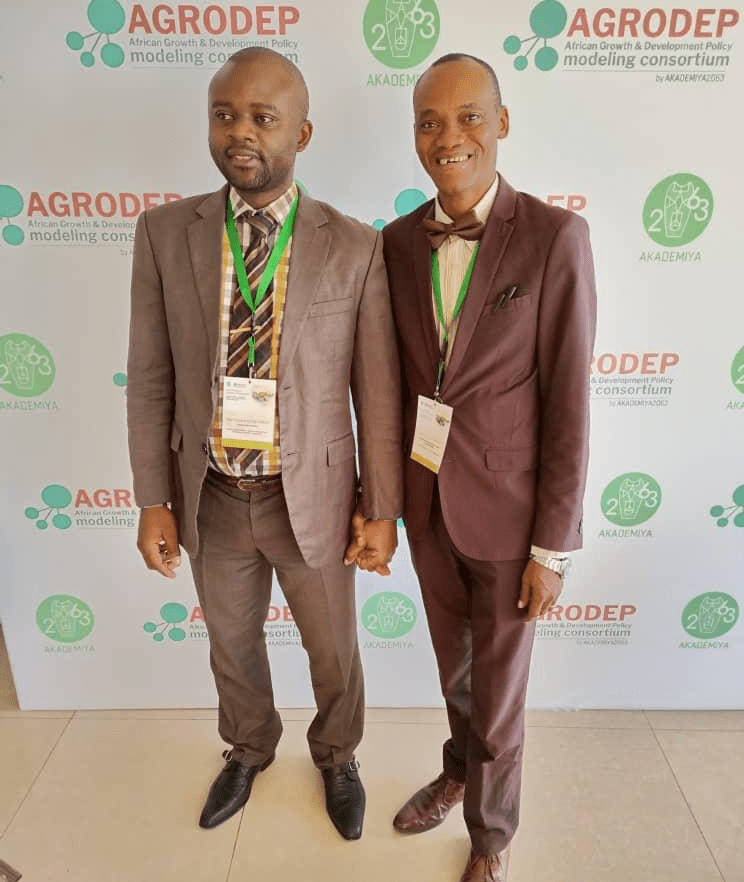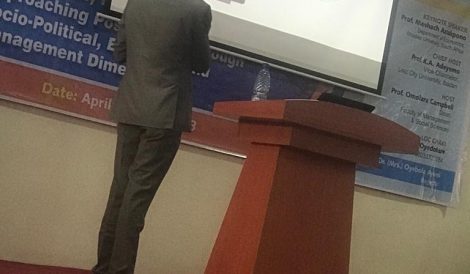Prof. Evans Osabuohien
- Posted on
- No Comments
Creating Resilient African Food Systems amid Health, War, and Climate Disruptions was the focus of the three-day African Growth and Development Policy Modelling Consortium (AGRODEP) 2023 Annual Conference. The conference was held in Kigali, Rwanda, and organised by the AKADEMIYA2063. The mission of AKADEMIYA2063 is to create across Africa state-of-the-art technical capacities to support the efforts by the African Union (AU) Member Countries to achieve the key goals of the Agenda 2063 by meeting the needs of African countries in terms of data, analytics and mutual learning for the effective implementation of Agenda 2063.
During the session, Prof Evans Osabuohien, who was fully funded by AGRODEP, being a member of the network since 2012, gave a presentation titled “COVID-19 Pandemic, Agricultural Risks, and Diversification Strategies of Smallholder Farmers in SSA”. The presentation drew insights from his research project funded by United Nations University-World Institute for Development Economics Research (UNU-WIDER). His presentation answered the following research questions: What factors determine farmers’ exposure to agricultural risks, and do they vary by the type of risk? How does context mediate the effect of various individual-level factors on agricultural risks? How do the drivers of agricultural risks differ across African countries? What is the effect of the COVID-19 pandemic on the welfare of farm versus non-farm households? What diversification strategies are adopted by farm households amidst the COVID-19 pandemic? The research report, co-authored with Abdul Malik Iddrisu and Alhassan Karakara, is online at https://doi.org/10.35188/UNU-WIDER/2022/251-5.
The report discussed the problems and examined how the COVID-19 pandemic affected smallholder farmers. Their research arrived at crucial findings, which include the following: Agricultural risk is determined by; Individual factors (education, gender, age, family business); context factors (locality, type of crop cultivated, and land tenure system); agricultural risks vary across countries; farmers in Mozambique and Uganda are less likely to experience agricultural risk compared to those in Cote d’Ivoire; farmers in Tanzania are more likely to experience risks related to weather & pest attacks compared to those in Cote d’Ivoire. They noted the summary effects of COVID-19, which included the Effect of COVID-19 on the welfare of farm vs non-farm households. Conclusively, they noted that various individual and farm level and contextual characteristics, with significant variability among context and African countries, greatly influence the likelihood of encountering dangers associated with agriculture. Finally, they demonstrate that during the COVID era, farm households’ revenues significantly decrease, while the farm households’ top five risk-coping techniques are saving, other sources of income, asset sales, and credit purchases.


Another high point at the conference was the ‘Brown Bag Presentation’, where AGRODEP members with interesting insights shared with the participants and organisers on the last day of the conference. Prof Evans Osabuohien seized the opportunity to showcase the lessons from his two recently edited books, “COVID-19 in the African Continent: Sustainable Development and Socioeconomic Shocks,” and “Socioeconomic Shocks and Africa’s Development Agenda: Lessons and Policy Direction in a post-COVID -19 Era“. He noted that the idea to write the books was incubated during the heat of the COVID-19 pandemic in 2020. The hallmark of his presentation on the making of the books includes: a valuable contribution to the literature on the response to COVID-19; a comprehensive review of the nature of the pandemic and its impact on Africa; insights into how this global health crisis will impact countries; issues that need to be addressed to mitigate future shocks and promote resilience; and policy recommendations on how to ensure that countries are resilient against future shocks and how they can adapt their policies so that they can respond effectively when such shocks occur again.
Furthermore, he remarked that the book chapters are an excellent synthesis of research findings from different disciplines, including economics, demographic studies, sociology, and political science. According to him, they provide an insightful assessment of various aspects of unprecedented epidemics/pandemics, such as their socioeconomic impacts, livelihoods, employment opportunities, and income losses. The authors have provided a wealth of information on how African countries responded differently during this period, with varying degrees of success or failure according to their circumstances at home and abroad. At the end of his presentation, he handed over an autographed copy of the book to Augustin Wambo Yamdjeu, Director of Knowledge Systems at AKADEMIYA2063.





